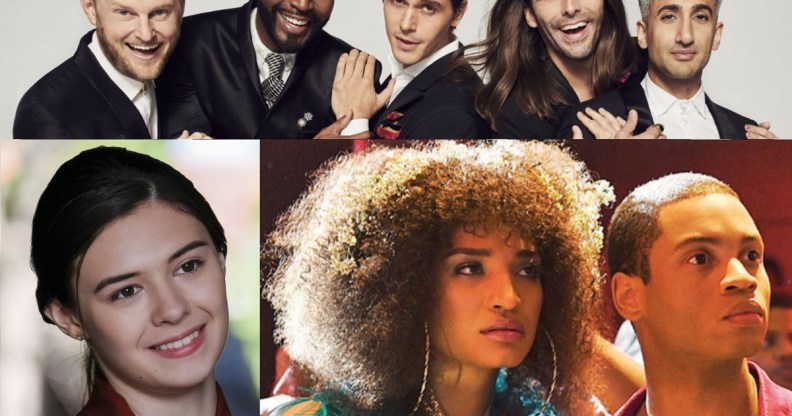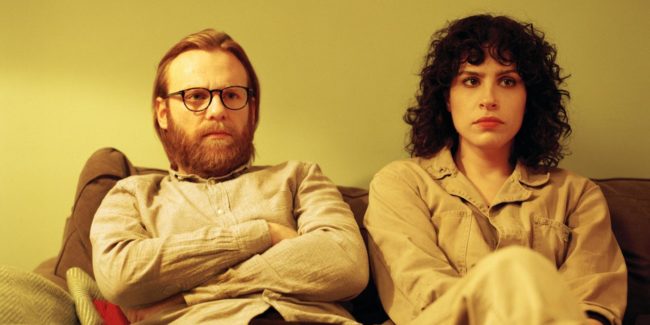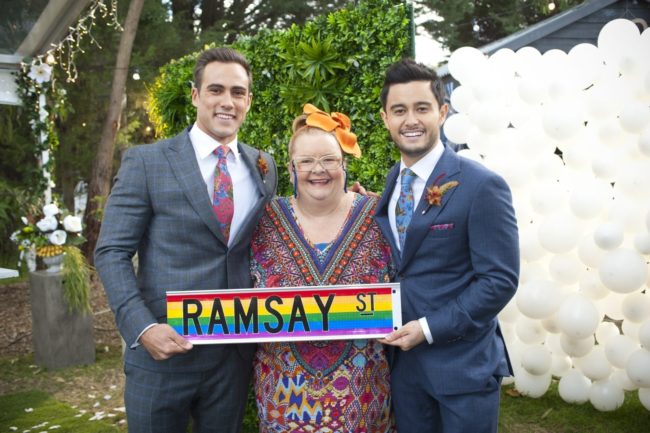The best queer TV shows of 2018

2018 has seen a range of stories and characters tell stories from all across the LGBT rainbow (netflix and fx and the cw)
It’s been a breakthrough year for queer TV shows on the small screen.
While film companies like Marvel are bending over backwards to erase anything that displays characters being explicitly LGBT—like the scene cut from Thor: Ragnarok which shows Valkyrie is bisexual—TV programmes are making huge strides.
From barrier-breaking transgender representation in Pose, Butterfly and Supergirl to the critically acclaimed Queer Eye and The Assassination of Gianni Versace: American Crime Story, 2018—or 20GayTeen, to give it its proper name—has not let us down.
Here are the 10 best examples of incredible queer representation from this year.
Pose
The landmark programme from prolific showrunner Ryan Murphy, whose other creations include Glee and Nip/Tuck, features the most transgender actors of any TV show in recent history.
The queer TV show, which is set in 1980s New York and portrays life in the city’s iconic queer ballroom culture—as most famously portrayed in the film Paris is Burning—is also produced by a diverse crew.
In July, this inclusive atmosphere saw Pose break another record, as Janet Mock made history by becoming the first trans woman of colour to direct a TV show.
Murphy also announced in May that he would be giving all proceeds from Pose to LGBT+ charities including trans legal aid charity The Sylvia Rivera Law Project.
And if you’re worried that the groundbreaking show will be a one-season wonder, never fear: it was announced in the summer that Pose will return for a second season in 2019—and it’s going to take place in 1989 and 1990.
Queer Eye
Where were you on February 7, when Queer Eye dropped and created a place for the Fab Five in your heart forever?
Right from the first episode with Tom’s emotional makeover, the reboot secured its place on the binge lists of queer viewers everywhere.
From Antoni’s avocado antics to Jonathan’s effortless enthusiasm and Bobby’s miracles, every episode in the programme’s two seasons was a joy.
The queer TV show, which won its first Emmy in September, has featured multiple queer stories in its run, including the series’ first ever trans participant and AJ, a gay man who came out to his stepmother, Haide, in perhaps the most tear-jerking moment of the series.
Queer Eye is also set to broaden its horizons in season three, when the Fab Five will makeover a lesbian for the first time.
The Assassination of Gianni Versace: American Crime Story
This Golden Globe-nominated programme picked up three Emmy Awards for the way in which it documented gay fashion designer Gianni Versace’s murder by Andrew Cunanan in 1997.
The fact that the second season of FX’s true-crime anthology, which is also helmed by Ryan Murphy, centred around such a prominent gay icon was extremely encouraging, even if his death was the whole point of the show.
Butterfly
Butterfly, a three-part British mini-series which focuses on 11-year-old Maxine’s decision to publicly present as female and transition, was the first major representation of trans people on British TV.
The LGBT TV show, which starred Anna Friel as Maxine’s mum, was praised by Susie Green, the CEO of trans kids charity Mermaids, as well as viewers and critics.
“In the UK, transitioning is depicted as a simple process, like puberty-blocking hormones are handed out like candies. I wanted to debunk this myth.”
— Tony Marchant
Screenwriter Tony Marchant explained that part of his motivation behind the show was a desire to educate people about the process of transitioning.
He said: “In the UK… transitioning is depicted as a simple process, like puberty-blocking hormones are handed out like candies. I wanted to debunk this myth, saying instead that it is a complex process.”
Marchant added that the “hysteria” around trans people in 2018 was “very reminiscent of Section 28,” in reference to the law enacted by Prime Minister Margaret Thatcher in 1988 which banned “promoting homosexuality” to minors.
A Very English Scandal
The PinkNews award-winning three-part series, which starred Hugh Grant and Ben Whishaw, told the true story of bisexual politician Jeremy Thorpe and his younger lover Norman Scott, who Thorpe allegedly tried to have killed to save his professional and personal reputation.
Thorpe, the then-leader of the Liberal Party, was put on trial over the allegations, which rocked British politics in the 1970s, at a time when being revealed as gay could be life-ruining.
Thorpe and Scott had reportedly been lovers in the 1960s, before homosexuality was partially decriminalised in England and Wales in 1967.
In May, Grant told PinkNews: “I think he [Thorpe] was very very tormented. When you feel your family’s threatened we’re all capable—however privileged or genteel—of surprising violence.”
The Bisexual
In a year which also saw the first ever bisexual dating show in the shape of The Bi Life, Desiree Akhavan’s Channel 4 show positioned bi people at the centre of a mainstream fictional series in a seemingly unprecedented move.

The Bisexual was one of many queer TV shows to light up 2018 (Channel 4)
Akhavan, who also directed The Miseducation of Cameron Post this year, plays Leila, a New Yorker who realises she’s bisexual in her thirties and breaks off her 10-year relationship with girlfriend and business partner Sadie (Maxine Peake) to explore her sexuality.
Akhavan’s own uneasiness with her bisexuality and the regular bi-erasure she experiences formed much of the inspiration behind the queer show, which dealt with some of the many stereotypes attached to bi people.
Supergirl
Season 4 of The CW show introduced its first ever trans character, Nia Nal—also known by her superhero name, Dreamer—who is played by trans activist Nicole Maines.
The series about Krypton’s favourite daughter has had many fan-acclaimed LGBT+ plot arcs over the years, including Alex Danvers’ emotional coming out storyline, but broke new ground this year.
Maines, who has featured prominently in the season so far, spoke about the importance of her part on Supergirl, saying that “having trans people play trans roles shows that we are valid in our identity and we deserve to exist as we do.”
Black Lightning
Black Lightning, another superhero show on The CW, features Anissa Pierce, a lesbian woman of colour who is not just a teacher, medical student and activist, but also—by the end of the first season—a kick-ass superhero called Thunder.
Thunder, who’s played by 28-year-old Nafessa Williams, starts the series with a girlfriend, before breaking up with her and getting a different girlfriend.
Both of the relationships were between two women of colour, still a rarity on TV, and were greeted with zero controversy or fanfare from the other characters.
Neighbours
In September, after 33 years on our screens, Neighbours showed its first ever same-sex wedding—and it was spectacular.
Aaron Brennan and David Tanaka tied the knot with the help of celebrity officiant Magda Szubanski, of Australian comedy Kath & Kim, with executive producer Jason Herbison revealing to PinkNews that they would be starting a family before too long.

Neighbours’ gay couple tied the knot in September, and it was spectacular (Neighbours)
There was a huge outpouring of support for the couple ahead of the wedding, as well as a huge number of fans who said that David and Aaron’s relationship had helped them or a friend or family member to come out.
Super Drags
There’s a lot wrong with 2018, but the fact that there is a cartoon on Netflix about drag queen superheroes is one of the best reasons to feel positive.
Super Drags, produced by the streaming company’s Brazilian content arm, features three gay colleagues who are forced to deal with their uptight, bitchy department store boss during the day, but spread their wings at night to take on a host of supervillains.
Wait, there’s more…
And there’s more to come, both next year and beyond.
Marvel is developing a TV show starring an all-female team of superheroes which could introduce a host of amazing queer characters to the small screen, while Big Bang Theory star Jim Parsons is developing a new gay comedy.
A lesbian Batwoman will be on your screen before long, starring Ruby Rose in the titular role, and a show about Leonardo da Vinci which portrays the Italian artist as “gay, vegetarian and left-handed,” is also in the works.
Bring on 2019, and more wonderfully queer TV shows.

